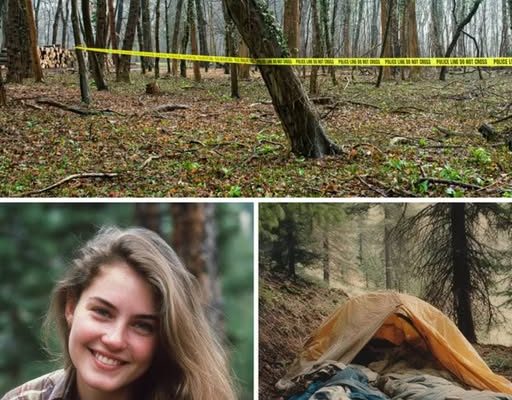In the summer of 2005, the serene trails of Roosevelt National Forest near Boulder, Colorado, became the backdrop for a tragedy that would haunt a community for nearly two decades. Grace Murphy, a 19-year-old environmental science student at the University of Colorado Boulder, vanished from her campsite during a weekend getaway with friends. Her disappearance sparked a massive search, captured national attention, and left her loved ones in a limbo of grief and unanswered questions. For 18 years, the mystery of what happened to Grace remained unsolved—until a chance discovery in 2023 uncovered a decaying tent, revealing a chilling truth that brought justice and closure to a case long thought cold.

Grace Murphy was a vibrant soul, known for her infectious enthusiasm and deep love for nature. A sophomore with a bright future, she thrived in her studies, dreaming of a career protecting the environment. Her warmth drew people in, creating a tight-knit circle of friends who shared her adventurous spirit. In July 2005, Grace and her college buddies planned a camping trip in Roosevelt National Forest, a favorite retreat from the grind of university life. The group arrived on a Friday, their laughter echoing through the pines as they set up camp. That evening, around a crackling campfire, they shared stories and marshmallows, savoring the freedom of the wilderness. Grace, feeling tired after the hike, retired early to her tent, bidding her friends goodnight. It was the last time they’d see her.
The next morning, her friends awoke to an empty tent. Her sleeping bag, backpack, phone, and car keys were untouched, and her car remained parked at the trailhead. Panic set in as they scoured the area, calling her name into the silent forest. When their efforts yielded nothing, they alerted park rangers and the Boulder County Sheriff’s Department. What began as a hopeful search for a lost hiker quickly escalated into a massive operation. Search and rescue teams, volunteers, and Grace’s family combed the rugged terrain, while helicopters scanned the vast forest from above. Divers checked nearby lakes, and search dogs sniffed for any trace of her scent. But the forest, with its dense undergrowth and steep ravines, seemed to swallow every clue.
The initial investigation was meticulous. Detectives found Grace’s tent undisturbed, her belongings neatly arranged—a half-eaten granola bar, a book, and a folded sleeping bag suggesting a sudden departure. Her friends confirmed she’d retired early, complaining of fatigue, with no plans to leave. No unusual noises were reported that night, deepening the mystery. The search expanded across hundreds of thousands of acres, but the challenging terrain frustrated efforts. As weeks turned to months, leads dried up. Theories ranged from Grace getting lost or injured to darker possibilities of foul play, but no evidence surfaced. The media frenzy—local news, then national outlets—kept her story alive, with posters of Grace’s smiling face plastered across Boulder. Yet, as time passed, attention faded, and the case grew cold, leaving her family in agonizing uncertainty.

For Grace’s parents, the years were a slow torture. Every milestone—birthdays, holidays, graduations—was marked by her absence, an empty chair symbolizing their unresolved grief. They clung to hope, organizing annual memorial hikes and establishing a scholarship in Grace’s name at her university to honor her passion. Her friends, too, struggled, their college memories forever tainted by loss. The Boulder community, initially gripped by the mystery, moved on, but the case file remained open. Detectives revisited it periodically, applying new technology and re-interviewing witnesses, but answers remained elusive. A 2012 case review and a 2015 media push on the 10th anniversary brought fleeting hope, but no breakthroughs.
Then, in spring 2023, a group of hikers ventured off the beaten path in a remote section of Roosevelt National Forest. Amid a thicket of aspens, they spotted a weathered tent, its once-bright fabric tattered by time. Inside, they found a decaying sleeping bag, clothing, and a plastic vial wrapped in duct tape, bearing a faded prescription label. A handwritten note, barely legible, carried haunting words: “Grace, sleep, quiet.” Sensing the gravity of their find, they alerted authorities. The Boulder County Sheriff’s Department secured the site, and detectives, led by Lieutenant Wesley Torres, descended with cautious optimism. This could be the break they’d waited 18 years for.
The tent’s contents were a game-changer. The vial contained a powerful sedative, and the prescription label pointed to Ethan Baker, a former teaching assistant at Grace’s university. Baker had been a minor figure in the 2005 investigation, interviewed briefly as someone in Grace’s environmental science class. The duct tape yielded a partial fingerprint and DNA, both matching Baker after forensic analysis at the Colorado Bureau of Investigation. This evidence transformed the case from a missing person mystery to a potential crime scene. Torres and his team dove into Baker’s background, uncovering that he’d been on the camping trip—a detail overlooked in the initial probe. He’d also exhibited obsessive behavior toward Grace, lingering after classes and appearing at her workplace, making her uncomfortable.
Grace’s roommate, Morgan Smith, provided critical insight. She recalled Grace confiding about Baker’s unsettling attention, describing him as “creepy” and planning to confront him. Investigators now theorized Baker drugged Grace during the campfire, possibly spiking her food or drink. Under the cover of night, he moved her tent deep into the forest, staging her disappearance. The note suggested a twisted keepsake of his crime. A search of Baker’s remote cabin in the forest revealed traces of Grace’s DNA, confirming she’d been held there. Confronted with the evidence, Baker confessed. He admitted to drugging Grace, intending to “scare” her into reciprocating his feelings, but his plan spiraled. Weakened by sedatives and captivity, Grace died in the cabin. Baker disposed of her remains in an abandoned mine shaft, which forensic anthropologists later excavated, identifying her remains.
The trial of Ethan Baker in 2024 gripped the nation. The prosecution laid out a compelling case: the sedative vial, Baker’s DNA and fingerprint, Morgan’s testimony, and his confession painted a picture of calculated obsession. The defense argued Baker’s actions weren’t premeditated murder but a tragic escalation, portraying him as a troubled man. The jury, unmoved, convicted him of first-degree murder and kidnapping, sentencing him to life without parole. For Grace’s family, the verdict was bittersweet—justice served, but their daughter was gone forever.
The resolution brought closure to Boulder. Memorial services celebrated Grace’s life, and her scholarship was revitalized, ensuring her legacy endures. The case underscored the power of persistence, with Torres’s team proving that even decades later, truth can surface. The decaying tent, a silent witness in the forest, became a symbol of hope and justice, reminding us that no mystery is too old to solve, and no loss too distant to honor.



